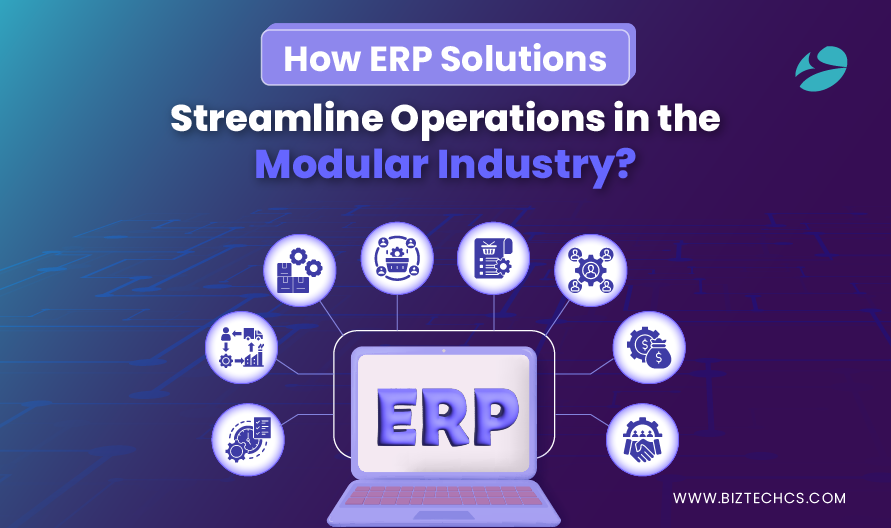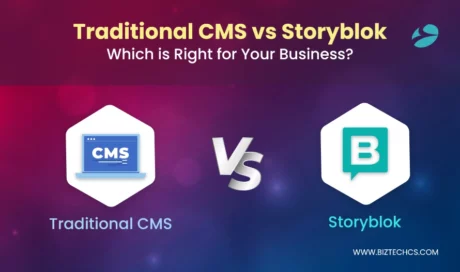1092
How ERP Solutions Streamline Operations in the Modular Industry?
10 Sep, 2024
5 min read
1092
10 Sep, 2024
5 min read
Table of Content

The modular manufacturing sector is expanding rapidly, and companies constantly seek strategies to enhance efficiency.
One best practice for revolutionizing operations is Modular ERP. ERP systems allow different aspects of a business to be managed in one system.
These modules of the ERP system simplify the actions related to production, inventory, and finances.
Some specific ERP modules, which can be embraced, can decrease work done under certain circumstances and thus increase efficiency.
Thus, an ERP system can be adapted to suit the requirements of a modular business because of the individual modules that are a constituent of an ERP system. In this blog, we will reveal how the Modular Manufacturing Industry benefits from ERP solutions for managing its operations.
There is another type called modular ERP that enables a firm to select only those required components.
ERP modules are individual components of the system, it can be finance, inventory, or human resources, etc.
These Modules Of An ERP system can be added or removed by the company based on business requirements. This flexibility makes Modular ERP preferable for fast-growing organizations.
It can be utilized in the Modular Manufacturing Industry to control production, supply chain, and other mechanisms.
More than 80% of manufacturers want to adopt Erp System Modules to enhance performance.
If the right Modules Of Erp are selected, the overall productivity can be enhanced by at least 20 percent.
1. Customization and Flexibility
Modular ERP Systems enables the company to select only the desired portion of the services, such as financial management, human resource management, supply chain management and customer relationship management. This level of customization is important for organizations with distinct business models or whose needs are constantly changing.
It prevents them from being charged for extras that are not necessary and guarantees the system is optimized for their needs. Other modules can be added where necessary as the business grows to cover the new complexities.
2. Scalability and Growth
Another benefit of a modular ERP is its flexibility as an aspect of the business model. Suppose a business grows or the company has some new requirement.
In that case, it is easy to customize this definite type of software by adding new modules to address various operations, like international tax policy, more precise supply chain management, new company division, etc.
This scalability can be effective for growing businesses and businesses venturing into new markets where operations are challenging and change frequently.
3. Optimized Performance for Different Departments
Different departments can get best-of-breed solutions that fit their requirements in a modular environment.
Finance can have a module that works with tax and reporting applications, while human resources can have payroll and talent management integrated into it.
Every department receives applications and tools within the larger ERP system context, so each group has the right tools for its operations without adjusting to a universal solution.
4. Cost Efficiency
Compared to a complete ERP system with many features that most companies will not use, businesses can opt for a modular system which only requires the necessary modules with a corresponding cost. It is an economic business model whereby the expenses incurred for a particular aspect are paid only when that aspect grows sufficiently to warrant such payment, proving advantageous, especially for SMEs and startups.
Also, implementation is more target-oriented and smoother when fewer modules are installed at the start, thus maintaining lower installation costs.
1. Streamlined Project Management
ERP systems help manage projects in the modular industry by providing an effective central project planning, scheduling, and tracking tool.
Real-time tracking enables timely management of the various milestones, costs, and resources used efficiently.
Working on larger projects with other disciplines also benefits from BIM integration, which enhances design coordination and keeps all parties informed.
Automated reporting helps provide valuable information to decide on resources and time investments’ necessity.
2. Enhanced Supply Chain Efficiency
Implementing ERP solutions enhances supply chain productivity and flexibility for the modular sector.
They enable physical tracking of materials in real-time, minimizing wastage due to early expiry of stocks and consistent delivery services. This positively impacts the organization since there is close communication with the suppliers to avoid materials being delivered later than required.
Demand forecasting assists manufacturers in being able to anticipate production better to prevent overstocking or stock-out situations.
3. Improved Quality Control
ERP solutions improve quality control in the modular industry by automating checks to ensure each component meets the required standards.
They track defects, making it easier to fix issues quickly and keep costs down. ERP systems also help manage regulation compliance so products meet local requirements, making the entire construction process smoother and more reliable.
4. Financial Management and Budget Control
ERP systems track costs and overheads in real-time, helping modular projects stay on budget at every stage.
With these systems, teams can manage fluctuating material costs or design changes without losing budget control.
Automated billing and accounting streamline cash flow management, reducing errors and delays. This ensures smoother financial operations and better profitability for modular projects.
5. Automation and Process Optimization
ERP solutions boost the modular industry’s efficiency by automating key manufacturing processes. This reduces human errors and speeds up production.
Workflow automation ensures smooth transitions through each stage, avoiding delays. With IoT and AI integration, real-time machinery monitoring and smarter production scheduling improve factory performance.
1. Understand Your Business Processes
When choosing the right ERP modules, it’s important to understand your business processes first.
Identify key functions like finance, sales, and supply chain, and note any challenges or bottlenecks.
Then, map out how data flows between departments to spot areas where integration is most needed. This will help you pick ERP modules that best support your specific operations and improve efficiency.
2. Prioritize Business Requirements
When choosing ERP modules for your business, it’s crucial to prioritize your needs by separating essential functions from optional ones.
Focus on modules vital for your core operations, such as accounting or inventory management.
Also, look for modules designed for your industry, like manufacturing for production or CRM for customer-focused businesses. This way, you can ensure the ERP system supports what matters most to your business without unnecessary features.
3. Evaluate ERP Module Options
When choosing ERP modules for your business, it’s important to prioritize your needs by separating essential functions from optional ones.
Focus on modules vital to your core operations, such as accounting or inventory management.
Also, look for modules designed for your industry, like manufacturing for production or CRM for customer-focused businesses. This way, you can ensure the ERP system supports what matters most to your business without unnecessary features.
4. Assess Scalability and Flexibility
When choosing ERP modules for your business, it’s important to consider scalability and flexibility.
You want a system that lets you easily add or remove modules as your business grows or changes.
Customization is key, so the ERP should adapt to your unique processes. Lastly, make sure the ERP integrates well with your existing tools like CRM or e-commerce, to avoid disruptions.
5. Involve Stakeholders
When choosing ERP modules for your modular business, it’s important to involve key people from different departments.
Managers and users can provide valuable input on what they need from the system. Consulting with ERP vendors is crucial to see how their modules match your business goals. Ask for demos and case studies to ensure the modules work well for your industry.
6. Budget Considerations
When choosing the right ERP modules, consider how each one adds to the overall cost. Focus on modules that give the best value by improving your business operations.
While initial costs matter, consider long-term benefits like reducing inefficiencies and boosting productivity. Pick modules that will support growth and smooth your processes over time.
7. Evaluate ERP Vendors
When choosing ERP modules for your modular business, it’s important to consider vendors with a strong reputation in your industry. This ensures they understand your specific needs and can provide the right solutions.
Look for vendors offering reliable customer support and training, making implementation smoother. Lastly, the system should be easy to use so your team can quickly adapt without a long learning process.
8. Test and Pilot the System
When selecting ERP modules for your business, testing and piloting them is important. Run a small trial using selected modules to see their performance in real situations.
During the pilot, gather user feedback to understand any issues or improvements needed. This allows you to refine your choices and processes before fully implementing the ERP system, ensuring it fits your business needs.
In conclusion, ERP solutions are crucial in streamlining operations within the modular industry.
They help businesses manage resources efficiently, reduce production delays, and improve workflow.
ERP systems offer real-time insights by integrating different departments, leading to better decision-making.
These solutions ensure inventory is managed accurately, reducing waste and unnecessary costs. Modular companies can deliver projects on time and within budget with enhanced project tracking.
If you want to integrate an ERP system into your modular business, we can guide you through every step. Our team specializes in tailoring ERP solutions to modular companies’ unique needs.

Artificial Intelligence (AI)
5177
By Devik Gondaliya
22 Apr, 2025

Storyblok
38926
By Devik Gondaliya
02 Apr, 2025

Storyblok
39814
By Devik Gondaliya
01 Apr, 2025